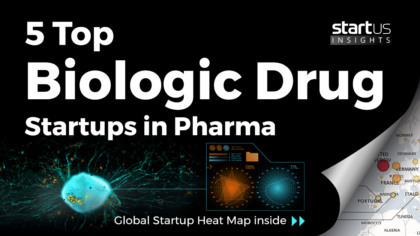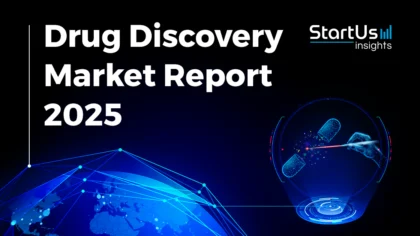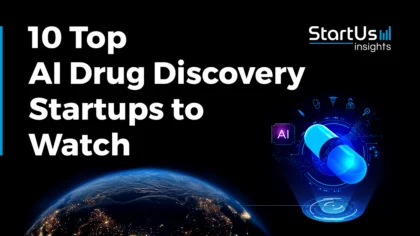Our Innovation Analysts recently looked into emerging technologies and up-and-coming startups working on solutions for the pharma sector. As there are a lot of such startups working on various different applications, we want to share our insights with you. This time, we take a look at 5 promising biologic drug startups.
Heat Map: 5 Top Biologic Drug Startups
Using our StartUs Insights Platform, covering 1.116.000+ startups & emerging companies, we looked at innovation in the field of pharma. For this research, we identified 546 relevant solutions and picked 5 to showcase below. These companies were chosen based on a data-driven startup scouting approach, taking into account factors such as location, founding year, and technology among others. Depending on your specific criteria, the top picks might look entirely different.
The Global Startup Heat Map below highlights 5 startups & emerging companies developing biologic drug solutions. Moreover, the Heat Map reveals regions that observe a high startup activity and illustrates the geographic distribution of all 546 companies we analyzed for this specific topic.
ILYA Pharma – Mini Bioreactors
While live bacteria have long been used as vaccines, advances in genetic engineering now allow for programming bacteria to produce therapeutic proteins as well. The development of methods to accurately deliver these engineered bacteria, at the target site, promotes their use as biologics. These biologic drugs produce therapeutic conditions only when they find the right niche.
ILYA Pharma is a Swedish startup that develops next-generation biologics for the treatment of wounds in skin and mucosa. Their solution uses live engineered bacteria that act like mini-bioreactors on the site of application and targets tissue-resident immune cells to accelerate wound healing. The startup is running human trials with a focus on treating post-surgical wounds, problematic diabetic wounds, and infections in the gastrointestinal tract.
Elasmogen – Small Proteins
Small proteins have a simple architecture that enables flexible reformatting to achieve systemic and site-specific delivery. They are also easy to synthesize as compared to antibodies or recombinant proteins. Moreover, these peptides are less immunogenic and cause lower side effects. For these reasons, they are attractive candidates as biologics.
British startup Elasmogen offers therapeutic biologics for the treatment of auto-immune mediated inflammatory diseases. The soloMER technology allows the startup to produce immune proteins for novel epitopes on a wide range of disease targets. The startup’s pipeline includes biologics in preclinical and in-vivo stages.
Cygnal Therapeutics – Exoneural Biology
The shift from synthetic and chemical drugs to biologics has enabled a range of new therapies. For instance, exoneural biology is a new frontier in medicine that aims to explore the role neuronal pathways play in cancer and immunological diseases. Other than new targets for common diseases, biologics also enable treatment for underserved conditions.
Cygnal Therapeutics is a US-based startup that develops biologics for exoneural medicine. Their Exoneural Medicine Platform (EMP) identifies key neural pathways implicated in diseases to identify targets with exoneural functions. The startup’s pipeline includes drugs for oncology and immuno-oncology, as well as for inflammation in the validation and early development stages.
TiumBio – Rare Therapeutics
Rare diseases affect only a small portion of the population. Sometimes, they are so uncommon that they lack a market large enough for pharma companies to invest resources, and to discover drugs for, and these are called orphan diseases. Biologics opens up new research and development (R&D) opportunities into drugs for rare and orphan diseases. Since most rare diseases are genetic diseases, information about the implicating gene and its product is valuable for rare therapeutics.
South Korean startup TiumBio provides rare therapeutics. NCE403, a small molecule biologic from the startup, is under clinical investigation for the treatment of endometriosis, uterine fibroids, and prostate cancer. Another drug, NCE401, is being investigated for cancer immunotherapy and idiopathic pulmonary fibrosis (IPF). The startup also develops biopharmaceuticals for the treatment of hemophilia.
Entos Pharmaceuticals – Nucleic Acid-Based Therapies
Nucleic-acid based therapies employ a suite of technologies including gene therapy, messenger ribonucleic acid (mRNA), micro RNA, RNA interference (RNAi), and clustered regularly interspaced short palindromic repeats (CRISPR). However, their success is contingent on the efficient delivery of the nucleic acid payload. Solutions that improve the efficiency of nucleic acids encourage their use as biologics.
Entos Pharmaceuticals is a Canadian startup that offers nucleic acid-based therapies. The Fusogenix platform uses neutral lipids and fusion-associated small transmembrane (FAST) proteins to facilitate highly efficient intracellular delivery of therapeutic nucleic acids. The startup’s pipeline also includes drugs for oncology and age-related diseases in development.
What About The Other 541 Solutions?
While we believe data is key to creating insights it can be easy to be overwhelmed by it. Our ambition is to create a comprehensive overview and provide actionable innovation intelligence so you can achieve your goals faster. The 5 biologic drug startups showcased above are promising examples out of 546 we analyzed for this article. To identify the most relevant solutions based on your specific criteria, get in touch.









